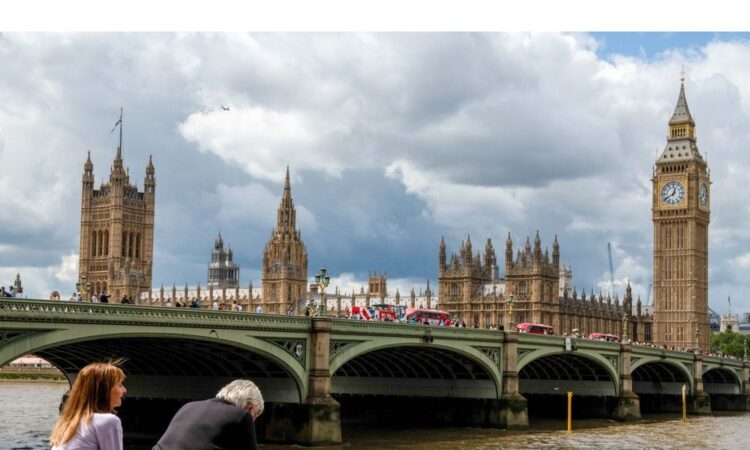
(Bloomberg) — UK government borrowing came in below official forecasts in the first four months of the fiscal year, providing potential room for Chancellor Jeremy Hunt to cut taxes.
The budget deficit between April and July was £56.6 billion ($72.3 billion), the Office for National Statistics said Tuesday. That’s £11.4 billion less than the Office for Budget Responsibility forecast in March.
This advertisement has not loaded yet, but your article continues below.
The deficit in July alone was £4.3 billion, below the the £5 billion median forecast in a Bloomberg survey but up from £1.1 billion a year earlier. The ONS also revised figures from earlier months, showing the total size of the Treasury’s debt never exceeded the size of the economy, a threshold that it previously said was crossed.
The revisions will likely do little to ease broader concerns about the pace of UK borrowing, with the country carrying £2.58 trillion of debt, or 98.5% of annual economic output. A heavy reliance on index-linked bonds at a time of high inflation also means that Britain is paying more to service liabilities than any other advanced economy.
Hunt will next have a chance to address the debt issue in an autumn budget statement expected in November. Some members of the ruling Conservative party, which is trailing Labour by double digits in opinion polls, have urged Prime Minister Rishi Sunak to cut taxes before the election.
“July’s public finances figures continued the recent run of better-than-expected news on the fiscal position,” said Ruth Gregory, an economist at Capital Economics. “But with interest rates still rising and a mild recession on its way, we continue to think the Chancellor will struggle to unveil a large package of permanent tax cuts.”
This advertisement has not loaded yet, but your article continues below.
July is one of the better months for the public finances, as income taxes pour in before a month-end deadline for self-employed workers. Income tax payments from self-assessments rose to £11.8 billion, which was £2.5 billion more than a year ago.
The undershoot so far in 2023-24 will be welcomed by Sunak’s Conservative Party, which is trailing as much as 20 points behind the Labour opposition in opinion polls ahead of a general election that’s widely expected to be held next year.
Treasury coffers are benefitting from a tight labor market, which is boosting taxes from wages, and the end of subsidies for household energy bills. These factors are helping to offset a surge in debt costs caused by higher inflation and interest rates.
Soaring wages have helped improve the public finances in the first four months of the current fiscal year. Income and capital gains tax receipts have risen by £10 billion compared with last year. Higher prices have raised another £5 billion extra in VAT and the corporation tax increase from 19% to 25% in April has generated an additional £4.4 billion.
This advertisement has not loaded yet, but your article continues below.
Hunt has signaled there will be no tax cuts in the Autumn Statement later this year. The scope for giveaways may also be limited, given the the government has little if any room against its rule that debt should be falling as a share of GDP in five years.
“As inflation slows, it’s vital that we don’t alter our course and continue to act responsibly with the public finances,” Hunt said in a statement. “Only by sticking to our plan will we halve inflation, grow the economy and reduce debt.”
Fitch’s shock decision the strip the US government of its AAA status has reignited questions about the UK’s credit rating.
Interest-payments between April and July amounted to £37.8 billion, driven by the cost of servicing bonds tied to the retail prices index. With inflation now falling, these costs should ease in coming months.
The public finances will remain under pressure nonetheless.
Government bond yields are close to their highest since 2008 amid aggressive rate hikes by the Bank of England to quell inflation. Meanwhile, the state pension bill is on track to rise as much as 8.2% next year under a “triple lock” government guarantee to increase the benefit by the level of earnings, inflation or 2.5%, whichever is highest.
That will cost taxpayers around £10 billion, according to online investment service Interactive Investor. Surging numbers of sick working age benefit claimants will cost the state another £15 billion in lost taxes and higher welfare, the government’s independent forecaster said last month.
Read more:
- Slow-Growing UK Faces Reckoning Over £2.6 Trillion Debt Pile
—With assistance from Joel Rinneby and Brendan Scott.
(Updates with details from the report and comment.)






